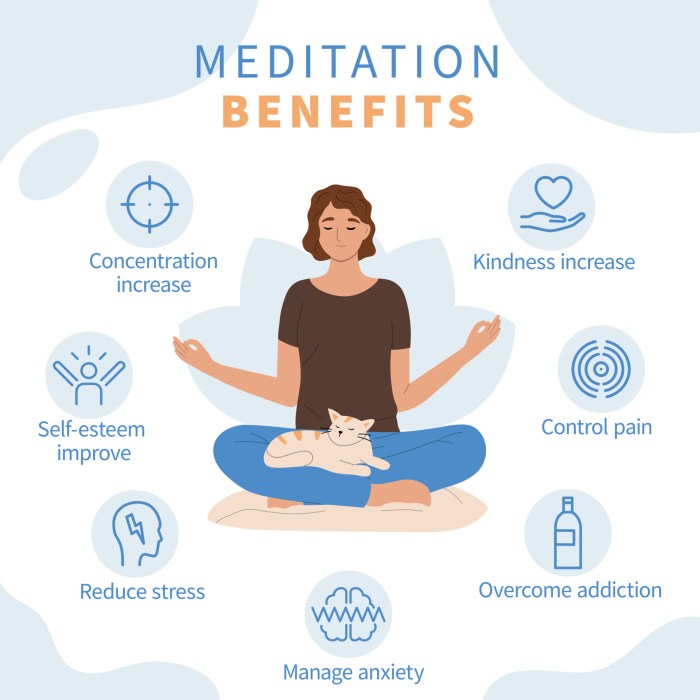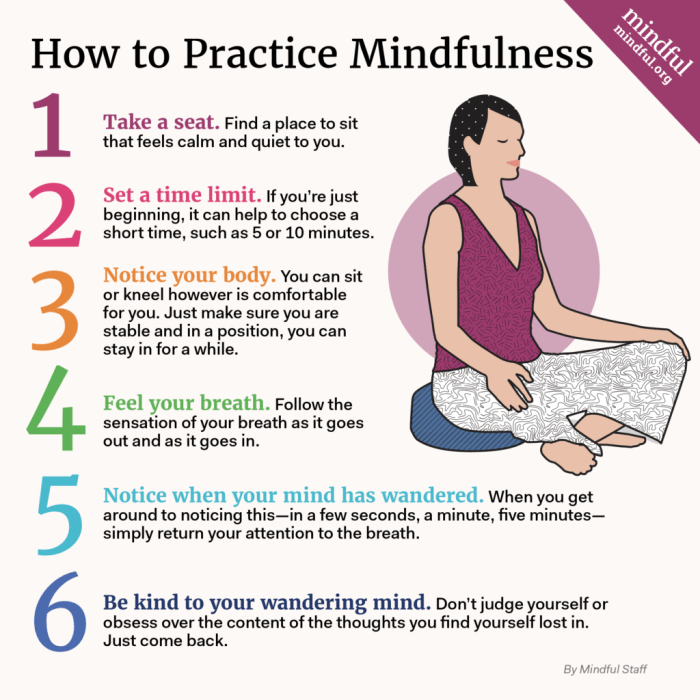As 20 Mindful Meditation Practices for Self-Care takes center stage, this opening passage beckons readers with hipwee author style into a world crafted with good knowledge, ensuring a reading experience that is both absorbing and distinctly original.
Embark on a journey to discover 20 unique mindful meditation practices that will revolutionize your self-care routine, enhancing not only your well-being but also your inner peace and tranquility.
Benefits of Mindful Meditation: 20 Mindful Meditation Practices For Self-Care
Mindful meditation is a powerful practice that can greatly enhance self-care routines. By incorporating mindfulness into daily life, individuals can experience a wide range of mental and physical benefits that contribute to overall well-being.
Improved Mental Health
Mindful meditation has been shown to reduce stress, anxiety, and symptoms of depression. By focusing on the present moment and cultivating awareness, individuals can better manage their emotions and develop a more positive outlook on life.
Enhanced Physical Well-being
Regular mindfulness practice has been linked to lower blood pressure, improved sleep quality, and reduced inflammation in the body. These physical benefits can have a significant impact on overall health and vitality.
Increased Self-awareness
Through mindfulness, individuals can develop a deeper understanding of themselves and their thought patterns. This increased self-awareness can help in making better decisions, setting boundaries, and fostering healthier relationships.
Types of Mindful Meditation Practices

Incorporating different mindful meditation practices into your self-care routine can help improve your overall well-being. Here are 20 different types of mindful meditation practices to consider:
1. Body Scan Meditation
- Focuses on scanning your body from head to toe, bringing awareness to each part.
- Helps release tension and promote relaxation.
2. Loving-Kindness Meditation
- Involves sending love and kindness to yourself and others.
- Enhances feelings of compassion and connection with others.
3. Breath Awareness Meditation
- Focuses on observing the breath without trying to control it.
- Helps calm the mind and increase present moment awareness.
4. Mindful Walking Meditation
- Involves walking slowly and mindfully, focusing on each step.
- Connects you with the present moment and nature.
5. Visualization Meditation
- Involves creating a mental image or scenario to focus on.
- Can help reduce stress and increase feelings of positivity.
6. Mantra Meditation, 20 Mindful Meditation Practices for Self-Care
- Repeats a word, phrase, or sound to focus the mind.
- Aids in concentration and calming the mind.
7. Sound Meditation
- Focuses on listening to calming sounds or music.
- Can help relax the mind and reduce anxiety.
8. Progressive Muscle Relaxation
- Involves tensing and relaxing each muscle group in the body.
- Promotes physical relaxation and stress relief.
9. Body Movement Meditation
- Combines mindfulness with gentle movement like yoga or tai chi.
- Improves flexibility, balance, and overall well-being.
10. Eating Meditation
- Focuses on eating mindfully, savoring each bite without distractions.
- Enhances appreciation for food and promotes healthy eating habits.
11. Chakra Meditation
- Focuses on balancing the energy centers in the body.
- Can help improve emotional and physical well-being.
12. Gratitude Meditation
- Involves reflecting on things you are grateful for.
- Promotes a positive outlook and increases feelings of happiness.
13. Body-Positivity Meditation
- Focuses on accepting and loving your body as it is.
- Promotes self-confidence and body acceptance.
14. Nature Meditation
- Involves connecting with nature and its calming effects.
- Reduces stress and promotes feelings of peace and tranquility.
15. Compassion Meditation
- Involves cultivating feelings of compassion towards yourself and others.
- Enhances empathy and emotional well-being.
16. Yoga Nidra
- A guided meditation that leads to deep relaxation and conscious sleep.
- Helps reduce anxiety, improve sleep, and enhance self-awareness.
17. Body-Scan Meditation
- Focuses on bringing awareness to different parts of the body.
- Helps release tension, reduce stress, and promote relaxation.
18. Self-Compassion Meditation
- Involves being kind and compassionate towards yourself.
- Enhances self-esteem, resilience, and emotional well-being.
19. Deep Breathing Meditation
- Focuses on deep, slow breathing to calm the mind and body.
- Reduces stress, anxiety, and promotes relaxation.
20. Open Monitoring Meditation
- Observes thoughts, emotions, and sensations without judgment.
- Increases self-awareness, clarity of mind, and emotional balance.
Mindful Meditation Techniques for Stress Relief

When it comes to reducing stress and promoting relaxation, mindful meditation techniques can be incredibly effective. By incorporating mindfulness into your daily routine, you can better manage your stress levels and improve your overall well-being.
Focused Breathing
One of the most common mindful meditation techniques for stress relief is focused breathing. This involves taking slow, deep breaths while paying close attention to the sensation of each inhale and exhale. By focusing on your breath, you can calm your mind and body, reducing stress and promoting relaxation.
Body Scan Meditation
Body scan meditation is another effective technique for alleviating stress. This practice involves mentally scanning your body from head to toe, paying attention to any areas of tension or discomfort. By bringing awareness to these areas and releasing any tension you may be holding, you can relax both your body and mind.
Loving-Kindness Meditation
Loving-kindness meditation focuses on cultivating feelings of love and compassion towards yourself and others. By sending positive intentions and well-wishes to yourself and those around you, you can promote feelings of connection and reduce stress. This practice can help shift your focus from negative thoughts to positive emotions.
Mindful Meditation Exercises for Emotional Well-being

Mindful meditation exercises play a crucial role in promoting emotional balance and well-being. These practices help individuals connect with their emotions in a healthy way, allowing them to process and understand their feelings more effectively. By incorporating mindfulness into their daily routine, individuals can enhance their emotional resilience and develop a deeper sense of self-awareness.
Cultivating Self-Compassion
- Practice self-compassion meditation by offering yourself kindness and understanding in moments of struggle or pain.
- Acknowledge your emotions without judgment and treat yourself with the same care and compassion you would offer to a loved one.
- Focus on positive affirmations and self-soothing techniques to cultivate a sense of inner peace and acceptance.
Emotional Awareness and Acceptance
- Engage in body scan meditation to tune into physical sensations associated with different emotions.
- Observe your thoughts and feelings without trying to change them, allowing yourself to experience emotions fully without resistance.
- Practice mindful breathing to create space between your emotions and reactions, fostering a sense of calm and clarity.
Gratitude and Positive Emotions
- Start a gratitude journal to reflect on moments of joy, love, and gratitude in your life.
- Engage in loving-kindness meditation to cultivate feelings of compassion and goodwill towards yourself and others.
- Focus on positive experiences and emotions to shift your perspective towards gratitude and contentment.
Integrating Mindful Meditation into Self-Care Routines

When it comes to incorporating mindful meditation into your self-care routine, consistency is key. By making mindfulness a daily practice, you can reap the full benefits it has to offer for your well-being.
Tips for Incorporating Mindful Meditation
- Start with short sessions: Begin with just a few minutes of meditation each day and gradually increase the duration as you become more comfortable.
- Choose a quiet space: Find a peaceful spot where you can meditate without distractions to fully focus on the present moment.
- Set a schedule: Establish a specific time each day for your meditation practice to make it a regular part of your routine.
Importance of Consistency and Commitment
Consistency is crucial when it comes to mindful meditation. By committing to a daily practice, you allow yourself to cultivate a deeper sense of awareness and mindfulness that can positively impact your overall well-being.
Success Stories of Mindful Meditation
-
After incorporating daily meditation into her self-care routine, Sarah noticed a significant reduction in her stress levels and an improved sense of calmness and clarity.
-
John, who struggled with anxiety, found that regular meditation helped him better manage his emotions and respond more mindfully to challenging situations.
Last Point

In conclusion, incorporating these 20 mindful meditation practices into your daily self-care routine can truly transform your life, leading to a more balanced and harmonious existence. Embrace the power of mindfulness and watch as it nurtures your mind, body, and soul in profound ways.